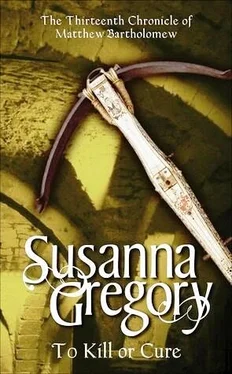‘Do not harp on the plague today ,’ hissed Michael irritably. ‘You will upset the students or, worse, encourage Matt to wax lyrical about it. Then his lurid descriptions will put us off our food.’
Bartholomew opened his mouth to object, but closed it sharply when his colleagues murmured their agreement. However, he thought Michael’s accusation was still unfair. The plague had shocked him to the core, because all his medical training had proved useless, and he had lost far more patients than he had saved. As a consequence, the disease was a painful memory, and certainly not something to be aired over the dinner table.
‘My point remains, though,’ said William, who always liked the last word in any debate. He wiped his dirt-encrusted hands on his filthy grey habit – a garment so grimy that his students swore it could walk about on its own – and began to assess which of the many dishes he would tackle first. Some strategy was needed, because Michael was a faster eater than he, and he did not want to lose out for want of a little forethought. ‘Everything costs more these days.’
The Master of Michaelhouse stood behind his wooden throne, watching the students shuffle into place in the body of the hall. Ralph de Langelee was a large, barrel-chested man with scant aptitude for scholarship and an appalling grasp of the philosophy he was supposed to teach. To the astonishment of all, he was proving to be a decent administrator, and his Fellows were pleasantly surprised to find themselves content with his rule. The students were happy, too, because, as something of a reprobate himself, Langelee tended to turn a blind eye to all but the most brazen infractions of the rules. His policy of toleration had generated an atmosphere of harmony and trust, and Bartholomew had never known his College more strife-free.
One of Langelee’s wisest decisions had been to pass the financial management of his impecunious foundation to a lawyer called Wynewyk, who was the last of the Fellows present. Wynewyk was a small, fox-faced man, who loved manipulating the College accounts, and Michaelhouse would have been deeply in debt were it not for his ingenuity and attention to detail. That morning, he was basking in the compliments of his colleagues for purchasing such an impressive quantity of food with a comparatively small sum of money.
‘Come on, come on,’ muttered Michael, as Langelee waited for old Kenyngham to reach his allocated seat. ‘I am starving.’
‘Do not make yourself sick, Brother,’ whispered Bartholomew. The monk was his closest friend, and he felt it his duty to dissuade him from deliberate overindulgence. The warning was not entirely altruistic, though: Bartholomew did not want to spend his afternoon mixing remedies to ease aching stomachs. ‘The statutes do not stipulate that we should devour everything today. We are permitted to finish some of it tomorrow.’
‘And the day after,’ added Kenyngham.
Michael shot them an unpleasant look. ‘I shall eat whatever I can fit in my belly. This is one of my favourite festivals, and I am weary of fasting and abstinence. Lent is over, thank God, and we can get back to the business of normal feeding.’
Before they could begin a debate on the matter, Langelee intoned the grace of the day in atrocious Latin that had all his Fellows and most of the students wincing in unison, then sat down and seized a knife. The servants, who had been waiting behind the screen, swung into action, and the feast was under way. Michael sighed his satisfaction, William girded himself up to ensure he did not get less than the portly monk, Langelee smiled benevolently at his flock, and Kenyngham, who was never very impressed with the Master’s famously short prayers, began to mutter a much longer one of his own. Bartholomew looked around at his colleagues, and thought how fortunate he was to live in a place surrounded by people he liked – or, at least, by people whose idiosyncrasies were familiar enough that he no longer found them aggravating.
Because it was a special occasion, Langelee announced that conversation was permitted. Normally, the Bible Scholar read aloud during meals – the Michaelhouse men were supposed to reflect and learn, even while eating. It was some time before anyone took the Master up on his offer, however, because Fellows, commoners and students alike were more interested in what was being put on their tables than in chatting to friends they saw all day anyway. Silence reigned, broken only by Agatha’s imperious commands from behind the screen and the metallic click of knives on platters.
‘Can we use the vernacular, Master?’ called one man eventually, once he had satiated his immediate hunger and was of a mind to converse. Bartholomew was not surprised that the question had come from Rob Deynman, the College’s least able student. Deynman would never pass the disputations that would allow him to become a physician, and should not have been accepted to study in the first place. Yet whenever Langelee tried to hint that Deynman might do better in another profession, the lad’s rich father showered the College with money, which always ended with the son being admitted for one more term. Bartholomew was acutely uncomfortable with the situation, and did not see how it would ever be resolved – he would never agree to fixing a pass, because he refused to unleash such a dangerous menace on an unsuspecting public, but he doubted even the wealthy Deynman clan would agree to paying fees in perpetuity.
‘It should be Latin,’ objected William pedantically. ‘Or French, I suppose.’
Langelee overrode him, on the grounds that he did not enjoy speaking Latin himself, and his French was not much better. ‘English will make a pleasant change, and we do not want our dinner-table chat to be stilted. I am in the mood to be entertained.’
‘I am glad you said that, Master,’ said Michael. He beamed around at his colleagues. ‘I anticipated the need for a little fun, so I invited the choir to sing for us.’
There was a universal groan. The monk worked hard with the motley ensemble that called itself the Michaelhouse Choir, but there was no turning a pig’s ear into a silken purse. It was the largest such group in Cambridge, mostly because Michael provided free bread and ale after practices. Most of the town’s poor were members, and he accepted them into his fold regardless of whether they possessed any musical talent.
‘How could you, Brother?’ asked Wynewyk reproachfully. ‘They will wail so loudly that it will not matter what language we use – we will not hear anything our neighbour says anyway.’
‘And we shall have to share the food,’ added William resentfully.
‘We will,’ said Kenyngham, when Michael seemed to be having second thoughts; the monk was rarely magnanimous where his stomach was concerned. ‘But it will be the only meal most of them will enjoy today, so I do not think we should begrudge it.’
Michael inclined his head, albeit reluctantly. ‘Do not worry about the noise, Wynewyk. I have been training them to sing quietly.’
‘Here they come,’ warned Bartholomew, as the choristers marched into the hall, caps held in their right hands. They were a ragged mob, mostly barefoot, and Deynman was not the only scholar to rest his hand on his purse as they trooped past him. In the lead was Isnard the bargeman, who hobbled on crutches because Bartholomew had been forced to amputate his leg after an accident two years before. He was a burly fellow with an unfortunate tendency to believe anything he was told, especially after he had been drinking, which was most nights.
‘You can lead the music today, Isnard,’ said Michael, barely glancing up from his repast. ‘You are here earlier than I expected, and I am still eating.’
Читать дальше












